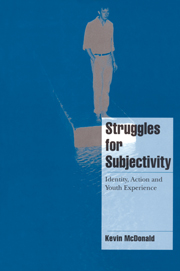PART I - The end of a working-class experience
Published online by Cambridge University Press: 05 December 2011
Summary
Serge and his friends are aged between 16 and 25. Serge was born in Westview, and has just turned 19. He is bright and optimistic, and the group revolves around him. He left school three years ago. He has had short-term jobs as a day labourer, but that is all. He comes from a family with a reputation of involvement in crime. Nick, the oldest in the group, is 25. He is different from the others, in that he has completed secondary school. Apart from short-term jobs, he has had no regular work in seven years. He is keen on kickboxing. Carson is 19. He left school at 15, and was unemployed for two years. He went back to school but was suspended after bashing a fellow student, breaking the terms of a contract which he had been obliged to sign following an earlier incident. Half his head is shaved, and he wears big boots and a bulky jacket. He is suspicious of the researchers who have come into his suburb.
Serge, Nick and Carson formed the core of this research group. Les and Rob were also involved in all the sessions. Royce and Paul participated in most, but Paul had to drop out after being arrested for assault and failing to get bail. Dave became involved towards the end, after being released from a Youth Training Centre, but had to pull out when, for reasons we never learnt, he had to hide from the police.
- Type
- Chapter
- Information
- Struggles for SubjectivityIdentity, Action and Youth Experience, pp. 15 - 22Publisher: Cambridge University PressPrint publication year: 1999



